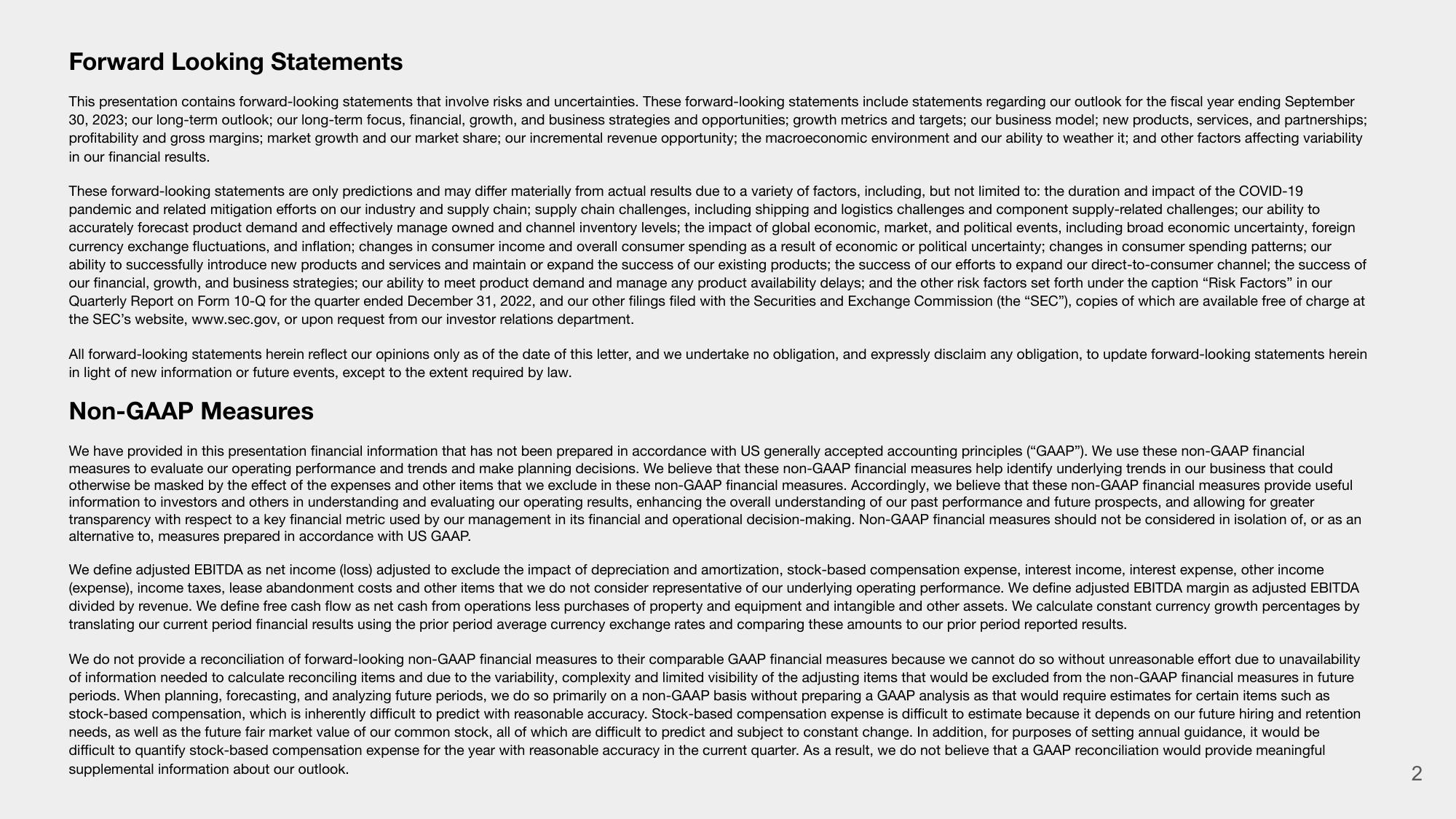Sonos Investor Presentation Deck
Forward Looking Statements
This presentation contains forward-looking statements that involve risks and uncertainties. These forward-looking statements include statements regarding our outlook for the fiscal year ending September
30, 2023; our long-term outlook; our long-term focus, financial, growth, and business strategies and opportunities; growth metrics and targets; our business model; new products, services, and partnerships;
profitability and gross margins; market growth and our market share; our incremental revenue opportunity; the macroeconomic environment and our ability to weather it; and other factors affecting variability
in our financial results.
These forward-looking statements are only predictions and may differ materially from actual results due to a variety of factors, including, but not limited to: the duration and impact of the COVID-19
pandemic and related mitigation efforts on our industry and supply chain; supply chain challenges, including shipping and logistics challenges and component supply-related challenges; our ability to
accurately forecast product demand and effectively manage owned and channel inventory levels; the impact of global economic, market, and political events, including broad economic uncertainty, foreign
currency exchange fluctuations, and inflation; changes in consumer income and overall consumer spending as a result of economic or political uncertainty; changes in consumer spending patterns; our
ability to successfully introduce new products and services and maintain or expand the success of our existing products; the success of our efforts to expand our direct-to-consumer channel; the success of
our financial, growth, and business strategies; our ability to meet product demand and manage any product availability delays; and the other risk factors set forth under the caption "Risk Factors" in our
Quarterly Report on Form 10-Q for the quarter ended December 31, 2022, and our other filings filed with the Securities and Exchange Commission (the "SEC"), copies of which are available free of charge at
the SEC's website, www.sec.gov, or upon request from our investor relations department.
All forward-looking statements herein reflect our opinions only as of the date of this letter, and we undertake no obligation, and expressly disclaim any obligation, to update forward-looking statements herein
in light of new information or future events, except to the extent required by law.
Non-GAAP Measures
We have provided in this presentation financial information that has not been prepared in accordance with US generally accepted accounting principles ("GAAP"). We use these non-GAAP financial
measures to evaluate our operating performance and trends and make planning decisions. We believe that these non-GAAP financial measures help identify underlying trends in our business that could
otherwise be masked by the effect of the expenses and other items that we exclude in these non-GAAP financial measures. Accordingly, we believe that these non-GAAP financial measures provide useful
information to investors and others in understanding and evaluating our operating results, enhancing the overall understanding of our past performance and future prospects, and allowing for greater
transparency with respect to a key financial metric used by our management in its financial and operational decision-making. Non-GAAP financial measures should not be considered in isolation of, or as an
alternative to, measures prepared in accordance with US GAAP.
We define adjusted EBITDA as net income (loss) adjusted to exclude the impact of depreciation and amortization, stock-based compensation expense, interest income, interest expense, other income
(expense), income taxes, lease abandonment costs and other items that we do not consider representative of our underlying operating performance. We define adjusted EBITDA margin as adjusted EBITDA
divided by revenue. We define free cash flow as net cash from operations less purchases of property and equipment and intangible and other assets. We calculate constant currency growth percentages by
translating our current period financial results using the prior period average currency exchange rates and comparing these amounts to our prior period reported results.
We do not provide a reconciliation of forward-looking non-GAAP financial measures to their comparable GAAP financial measures because we cannot do so without unreasonable effort due to unavailability
of information needed to calculate reconciling items and due to the variability, complexity and limited visibility of the adjusting items that would be excluded from the non-GAAP financial measures in future
periods. When planning, forecasting, and analyzing future periods, we do so primarily on a non-GAAP basis without preparing a GAAP analysis as that would require estimates for certain items such as
stock-based compensation, which is inherently difficult to predict with reasonable accuracy. Stock-based compensation expense is difficult to estimate because it depends on our future hiring and retention
needs, as well as the future fair market value of our common stock, all of which are difficult to predict and subject to constant change. In addition, for purposes of setting annual guidance, it would be
difficult to quantify stock-based compensation expense for the year with reasonable accuracy in the current quarter. As a result, we do not believe that a GAAP reconciliation would provide meaningful
supplemental information about our outlook.
2View entire presentation